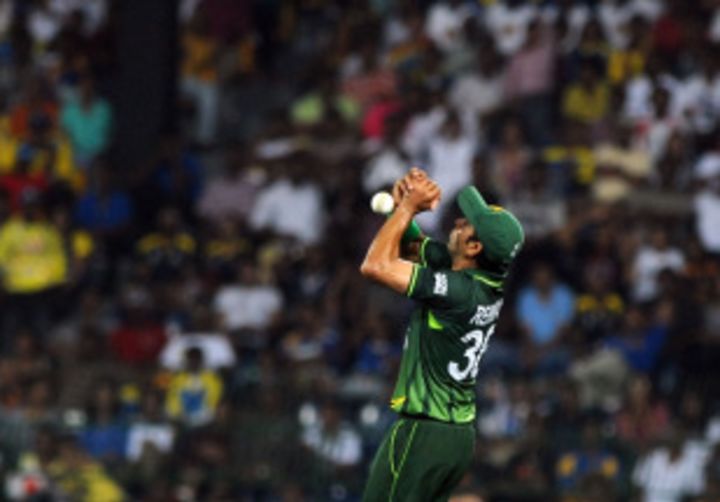Pakistan finally focus on fielding
During this World Cup, watching Pakistan practice fielding drills has been the best, possibly most revealing, part of watching them

The maxim that fielding is a measure of a side's togetherness and quality - like many other cricket maxims - has never applied to Pakistan. They have mostly disproven it, winning matches despite dropping catches, turning singles into doubles and doubles into boundaries. Their game has never been geared particularly to percentages, or details; the big and small plan is to win, everything else is left to higher forces.
But with the greatest caution it can be said, broadly over the last few months and series, there has been - improvement is too strong a word - a growing lack of errors in the field. They are still capable of putting together the kind of sequence they did against Sri Lanka at the Premadasa on Saturday. But one reason those lapses were noted so extensively was because they haven't been so common.
Setting aside the science of fielding momentarily, the most visible change has been the energy players bring to the field and not only on match days. Pakistan's fielding sessions during practice, even as recently as last year, used to operate like government offices, meandering along, wrapped in the warm comfort of bureaucracy and lethargy; things will happen when they need to happen, meanwhile how's the weather?
During this World Cup, however, watching Pakistan practice fielding drills has been the best, possibly most revealing, part of watching them. Nothing outlandish or path-breaking is being done. High catches, low catches, recreating match situations, run-out drills; it all happened before. But the zeal and energy invested into them has been unlike anything this correspondent has seen with them.
A number of people have contributed to this, led by Waqar Younis. In his youth, the Pakistan coach was athletic, no more, with a stinging throw. In practice, however, he builds such intensity you can sense how dearly he misses playing the game. The core group of fielders who dominate these sessions capture the balance of this squad in terms of youth and experience: Ahmed Shehzad, Umar Akmal, Mohammad Hafeez, Younis Khan and Misbah-ul-Haq.
The two eldest - Misbah and Younis - according to a few players are the ones who have really led the way. Both are the best catchers close in and on the boundary. The youngest, Shehzad and Akmal, are the wheels in the field, to keep things ticking over, keep up spirits. They are the ones who throw themselves around the most in the circle and who make the most noise, who man the boundaries at the death. It is why their batting failures might not always be scrutinized as much as others are; both look every bit the modern-day cricketer in the field as much as someone like Mohammad Yousuf or Saeed Ajmal might not.
Waqar knows they have made an impact. "The youngsters have made a big difference, guys like Ahmed Shahzad, Umar Akmal, Asad Shafiq, but also Younis Khan, who is still as energetic as any youngster," he said. "That makes a big difference, if you have a few guys in the side who push everyone else to do things in fielding practice and in the middle. Umar and Ahmed you see are running around in matches making sure things are sorted quickly, catching most of the things."
If nothing else, it can be said that this Pakistan side dislike fielding a little less than many previous ones, though we are talking degrees here. Let alone the rest of the world, Pakistan are not the best fielding side in their own backyard. Sri Lanka and Bangladesh long flew past them and even India struggle to generate the sense of total meltdown Pakistan did when Sri Lanka batted on Saturday.
"If you go back ten or 20 years, we have come a long way, we have really improved a lot," Waqar said, an irrelevant scale given how much the game has changed. But "there is still a long way to go, if you look at other sides who are still far ahead of us, like South Africa, Australia, England."
It is not a change of personnel but a change of thinking, which is what is encouraging about the arrival of players such as the younger Akmal, Shehzad and Shafiq; it suggests that below the national team, change may be brewing.
"The culture needs to come where they understand that fielding is the most important part," Waqar said. "They love their batting, you go into the nets, they're still hitting the ball around. In bowling, they are doing their job, but when it comes to fielding the culture is not there yet. We're getting there but there is still a long way to go."
Osman Samiuddin is Pakistan editor of ESPNcricinfo
Read in App
Elevate your reading experience on ESPNcricinfo App.